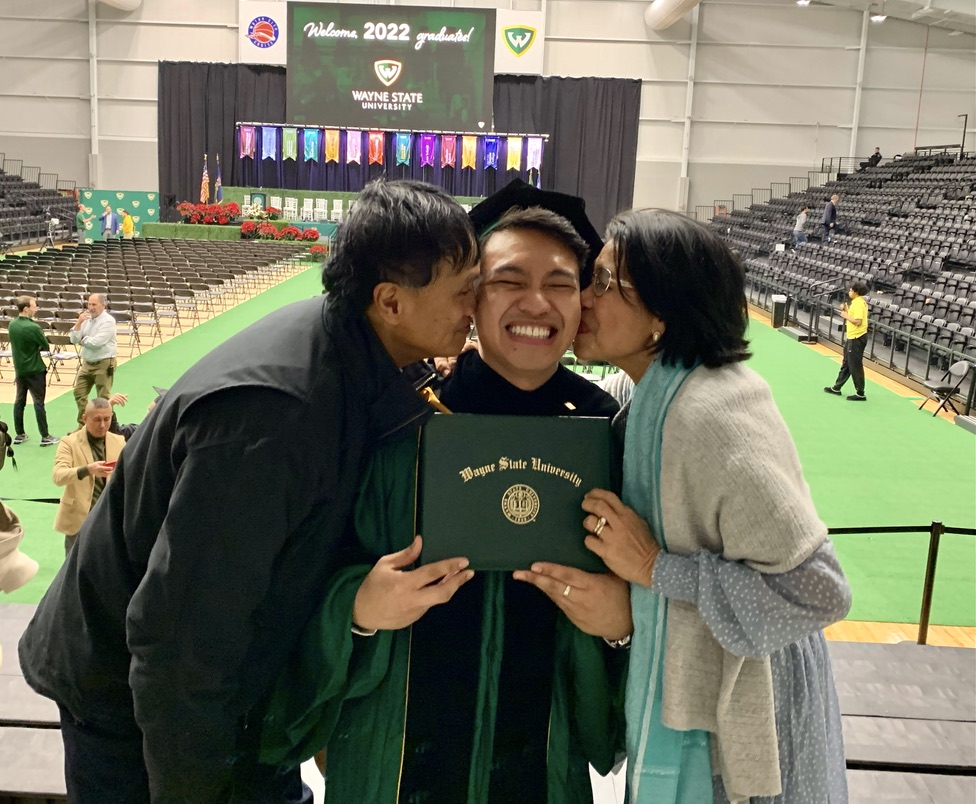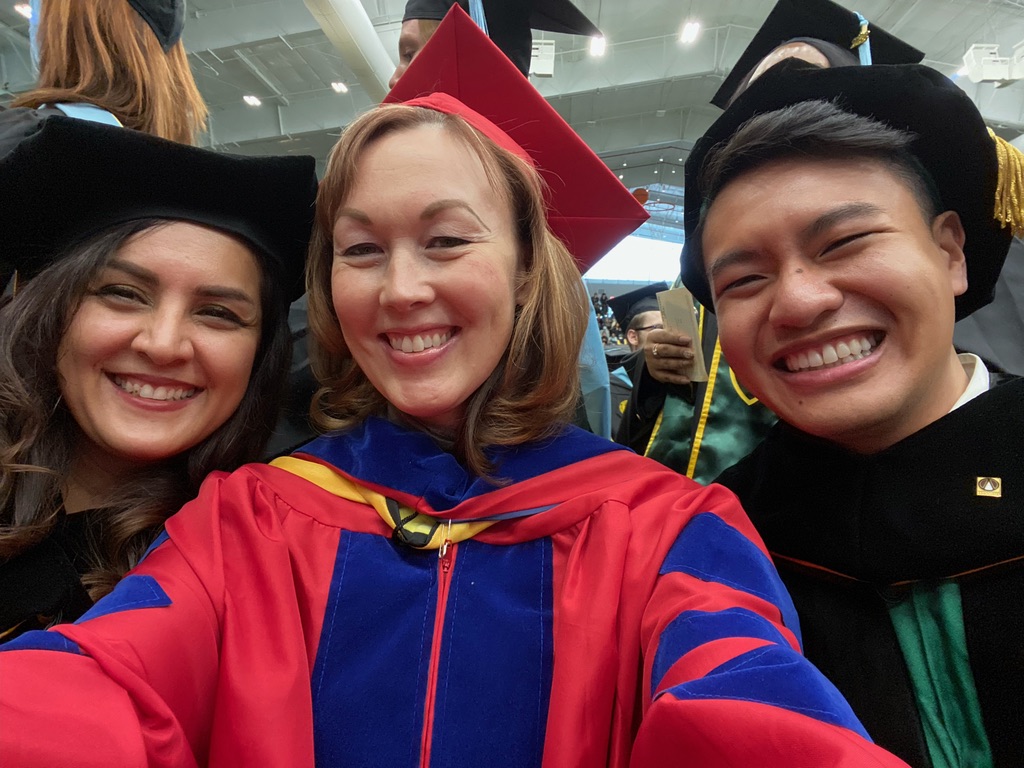James Mallare makes his mark by compiling nation’s first report on the state of school health professional preparation programs
As a high school senior, James Mallare was not sure what university he wanted to attend. Born and raised in Windsor, Ontario, he had submitted applications to various colleges and universities across Canada. An invitation from his best friend — who was applying to Wayne State’s Health ProStart program — and the promise of visiting Somerset Mall led him to the university.
“I came here by chance,” he said. “My best friend said, ‘Let's go to Wayne State to check out the campus. It's just across the border, and after we're done, I promise we’ll go shopping.’ We visited campus, then went to Greektown to get gyros at Nikki’s Greek Café. When we exited the restaurant, there was a Wayne State bumper sticker on my car.”

Mallare took it as a sign. Within weeks, he applied to Wayne State, and in early August, he was back on campus for orientation.
Interested in pursuing a career in health care, Mallare began studying pre-nursing. After shadowing a few nurses, he realized he did not want to work with individuals who had already contracted chronic diseases — he wanted to help prevent people from getting them in the first place.
“I remember noticing that many issues people visited the emergency room for — diabetes, hypertension, and congestive heart failure — were preventable and often caused by health disparities,” he said. “I figured there had to be a career that met people where they were before they visited the ER. My advisor suggested I try community health. I took the Foundations of Health and Health Promotion course and fell in love with the field.”
During his senior year at Wayne State, Mallare became a school health liaison for the Detroit Public Schools. He visited high schools and taught nutrition education through the Community Health Pipeline.
“I conducted food tastings, coordinated summer camps, brought students to Eastern Market and other local farmers markets, showed them what it means to have a farm-to-table lifestyle, and introduced them to the community health field,” he said. “I became passionate about school health, and that’s how I ended up in school health policy.”
Mallare decided to earn a doctorate. He applied to several graduate programs but chose to remain in Detroit.
“Wayne State was home to me,” he said.
Mallare’s research is focused on how school health educators are prepared to teach health. He noted that in the past, school health educators and physical education teachers served two distinct roles. More recently, those roles have merged, which has led to more emphasis on physical education than on school health.
“We can tell young people they have to exercise and teach them to throw a baseball, but we need to couple that with teaching them to prepare healthy meals, observe safe sex practices, and avoid drug and tobacco use if we want to achieve specific health outcomes,” he said.
Mallare evaluated preparation programs across the nation to determine whether what he referred to as “specific markers of a good health education curriculum” are covered in college courses. He said those topics include the tenets of school health, chronic disease management, nutrition education, physical activity, tobacco and drug abuse and prevention, and social emotional learning.
“If these subjects are taught at higher education institutions and that information trickles down to schools, health trajectory outcomes for students should be met,” he said. “If school health educators are not well prepared, we're going to see an increase in the spread of chronic diseases, shorter healthy life outcomes, and a higher prevalence of untreated mental health problems as well as drug abuse and addiction. If school health educators are not addressing these issues, we're not giving young people a strong foundation for exhibiting healthy behavior.”
The second part of Mallare’s study centered on determining how to support institutions that fall short in their preparation of school health educators. He explored how organizations such as the Society for Public Health Education (SOPHE) and American School Health Association could create tools and resources to help universities and teachers in training meet their professional development goals as well as their higher education institution’s goals. Mallare said he is particularly proud that he and his dissertation advisor, Rachael Dombrowski, compiled the United States’s first contemporary school health professional preparation program evaluation.
“Communicating with so many professors, doctors and educators across the nation was a unique opportunity,” he said. “To have experts discuss issues, trends and the future of school health with me and to compile the nation's first comprehensive report was a highlight of my Ph.D. journey. Visiting the CDC and sharing what I discovered with their experts was such a moment for me because I cited the CDC often in my undergraduate and doctoral coursework. Back then, I never thought I would be sharing my ideas with or obtaining dissertation feedback from them. I don't think any other doctoral student in my field had that opportunity.”
Mallare hopes higher education institutions read the report and incorporate its recommendations into their programs.
“The report details the current state of school health across the country right now,” he said. “It's not a direct evaluation of school health, but it gives us a snapshot of what's happening and what we can do better.”

In between his work with SOPHE in collaboration with the CDC, institutions of higher education and school health teachers across the country and his pursuit of a Ph.D., Mallare volunteers at nonprofit clinics in Detroit. A certified community health educator, he assists patients with understanding their treatment plans and medications and implementing healthy behaviors and lifestyle changes. Mallare also develops evaluation tools and conducts needs assessments.
“When I graduated from my bachelor’s program, I knew how to do a needs assessment,” he said. “The community health program is unique in that it gives students the opportunity to get that hands-on experience and strengthen those skills.”
Mallare said conducting needs assessments also taught him that community health educators must become part of the communities they serve. He said he lives downtown in an area that allows him to see two extremes: neighborhoods with large homes, fancy streetlights, and multiple grocery stores and health centers versus communities where there is low-income housing, no streetlights, and no stores or primary care centers.
“The challenge for community health educators is becoming one with the community and living where their clients, patients or students are so they really get to know the unique health disparities and inequities that they face,” he said, “I am grateful I can see those extremes and can get to my clients within a matter of minutes. I would not be able to do that if I lived in Canada. I could have commuted, but I would have been completely disconnected from my work.”
While he finds his work gratifying, Mallare said community health educators are still not viewed as valuable members of the U.S. health care system or as health professionals who can help improve health outcomes, particularly among underrepresented populations.
“Community health educators are necessary because we play an important role, but we are not used effectively in the current health care system,” he said. “Most medical doctors, nurse practitioners and physician assistants could probably not explain what we do because our role is not as widely understood as it should be. However, if you ask people who have been treated in a nonprofit clinic or community health center who helped them, they will most likely say, ‘a community health educator or a community health practitioner helped me.’ It iis great work, but we just aren’t there yet. As professionals, we still need to work on advocating for ourselves.”
Mallare said he is also grateful to have learned from faculty experts.
“Rachel Dombrowski, Noel Kulik, Marianne Fahlman and Jean Barcelona — women at the forefront of the field — really helped me understand what it means to be a community health practitioner. I am fortunate that they took me under their wings, and while they were writing the manual of community health education, they gave me the opportunity to write in the margins, so to speak, and add my two cents about what it means to be a community health educator. I could not have gotten that anywhere else. No other institution could have offer me what I was looking for: a well-rounded, opportunity-filled and very extensive preparation program in community health education.”
As he plans for life after graduation, Mallare said he would like to achieve several goals. He wants to continue conducting research with SOPHE through the support of the CDC Healthy Schools Branch. He plans to keep serving as a school health educator so he can implement school-based wellness initiatives, integrate school-based health centers into middle and high schools, and ensure that school districts follow school-based policies that have become law.
“Some school systems don't have a point person to help them navigate through school health policies,” he said. “I would love to help identify and implement those policies so that students and staff are able to meet their health goals.”
In addition, Mallare looks forward to training the next generation of community health educators.
“As a graduate research assistant, I co-taught the Health Policies class” he said. “It's such a joy to see students get excited about doing this work and becoming part of the profession. They are my future colleagues, so I must make sure they're well prepared.”
Mallare also had encouraging words for others interested in making a difference in a health care role.
“For anyone considering community health, where your passions meet the world's needs, that's where you're supposed to be,” he said. “You might be passionate about nutrition, environmental health, or child and maternal health. Go where your passions lead you but consider what the world needs related to your passions. Once you've identified the intersection where the world’s needs and your passions meet, go for it and don’t turn back.”
Media contact:
Tracy Boyce
tracy.boyce@wayne.edu
313-577-0260